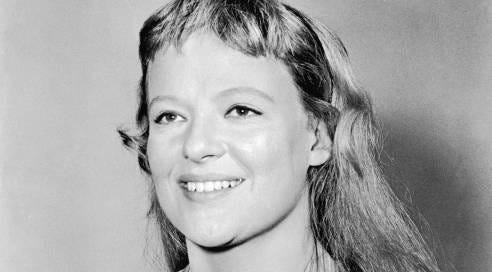Kim Stanley: Relationships
"I wanted to have good relationships with the characters I played, but if you’re not healthy, if you’re not honest—and I was neither—you can’t be a good actress."
James Grissom: Marian Seldes spoke of acting as being based on relationships. Relationships between actors and characters; actors and actors; actors and directors; actors and audiences…Why are you making that face?
Kim Stanley: It was an uncomfortable face. It was a face of regret. I spent a lot of time avoiding or making fun of Marian. What I was doing—out of anger and fear—was pushing away what she was telling me. She’s right. She’s often right. But, you see, I have failed so often with relationships, so when she would say those things—or when people would tell me about things like that—I had to respond as I did. Angry. Dismissive. I was the failure, but I chose to react as though she was the failure.
For a long time, the only successful relationship I had was with alcohol. That was the love affair that worked. I mean, it’s not a love affair that really works, but it felt as though it did. I wanted to have good relationships with the characters I played, but if you’re not healthy, if you’re not honest—and I was neither—you can’t be a good actress. You can get some good effects, for a time, but you can’t be consistently good, which is, I think, the point.
I wanted to escape into my characters and my plays, but I didn’t have the equipment—the discipline, the strength—to do it. I thought my imagination would be enough.
James Grissom: You mention imagination, which Stella Adler thought was the primary tool for an actor, whereas…
Kim Stanley: Is that what she said? Or taught? I think you’re getting it wrong. I’m not saying you didn’t read that somewhere, but a lot of misinformation is out there about all the teachers. I know the argument: Stella allegedly taught that no one cares about your life and your history—your inventory—but bring us your imagination, to enlarge and enhance your work. And Lee [Strasberg], it is said and written, by people who were not there, did not study with him, stressed only the personal life of the actor. Bring only your emotions and your lineaments to the work.
This is nonsense.
My job is not to defend either of those people, but I believe that both are right, at least in this limited discussion we’re having. I don’t think for a moment that there is an actor on earth who is creative or brilliant enough to apply only a layer—no matter how thick—to parts written by Chekhov or Shaw or Shakespeare. I mean, I can dream. I dreamed a lot. Sober and drunk. Some great ideas percolated within me, but none of them were sufficient for me to come to a part by Congreve, say, and improve upon it. So I would have been lost—and bad—if I had approached a part as Stella is alleged to have instructed. And I don’t think she’s being truthfully represented.
By the same token, it is not enough for me to go into a character with only my early abuses and fears and phobias and layer them onto a part. People think that is the primary thing Lee taught, but it is not true. Yes, he wanted us to bring what was uniquely ours—our histories—to a part, but the relationship is to the part. That is the relationship, and how do you have a relationship if you can’t commit yourself—your very personal self— to a part or a person or anything?
So, yes, you examine yourself to see what you have in common with a character, based on your life, on your experiences, but then you apply your imagination to the job because my dry and sad childhood is not sufficient to serve a great playwright. Any playwright. So I imagine if Cleopatra or Maggie or Masha might have had experiences like mine. Imagination allows me—any actor—to take that knowledge into the character. Within the parameters of a character, you bring both your history and your imagination, and I can’t even count the number of times Lee taught me that.
So I’m tired of the nonsense about Lee, about Stella, about all of them. I keep saying I’m going to ignore it all, but then someone sends me something or tells me something.
Look, Marian was right. Acting is all about relationships, and I was really bad at being healthy enough to have a decent relationship with anything or anyone. That’s why I made that face. You reminded me of how poorly I treated her. How poorly I treated myself. How poorly I often was when acting, which I told myself I loved more than anything else.
Interview with Kim Stanley
Los Angeles, 1992



